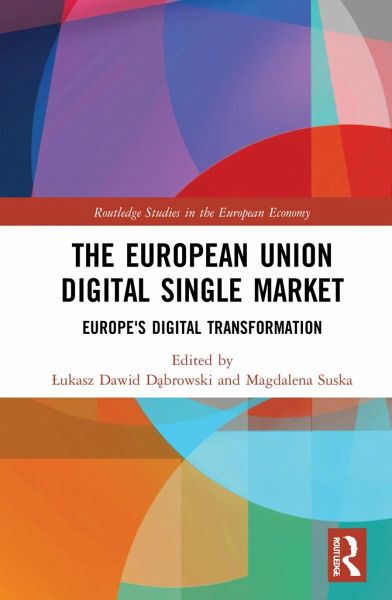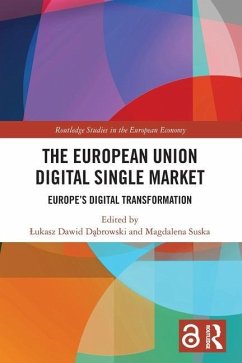
The European Union Digital Single Market
Europe's Digital Transformation
Herausgegeben: Dabrowski, Lukasz Dawid; Suska, Magdalena
Versandkostenfrei!
Versandfertig in 6-10 Tagen
154,99 €
inkl. MwSt.

PAYBACK Punkte
77 °P sammeln!
According to the European Commission, two recent policies: the Digital Service Act and the Digital Market Act will allow for the regulation of a significant part of the EU Digital Single Market (DSM), to an extent similar to the creation of the traditional internal market in the early 1990s. The provisions are intended to improve conditions in the EU DSM to ensure that the market is as free and fair as it is safe for users of the digital economy. This interdisciplinary book analyses the impact of digital technologies on specific markets and, more broadly, the society and the economy. It identi...
According to the European Commission, two recent policies: the Digital Service Act and the Digital Market Act will allow for the regulation of a significant part of the EU Digital Single Market (DSM), to an extent similar to the creation of the traditional internal market in the early 1990s. The provisions are intended to improve conditions in the EU DSM to ensure that the market is as free and fair as it is safe for users of the digital economy. This interdisciplinary book analyses the impact of digital technologies on specific markets and, more broadly, the society and the economy. It identifies and assesses the different features, challenges, trends and dimensions of the EU DSM, from a legal and economic viewpoint, and also from a Polish perspective. Poland is presented as one of the EU countries participating in the creation of the EU DSM and is analysed alongside the average, as well as the best and the worst performing EU member states and compared with other non-EU members. The book addresses several broad areas in which the implications of digitalisation are particularly visible, and which are important to the average person: giant online platforms, freedom of speech, e-commerce, digital levy, energy infrastructure, and the labour market. The authors have presented opportunities and threats related to the functioning of the digital market. These opportunities and threats are typical of highly developed countries while reflecting the specific features of the EU DSM. The starting point of the considerations are the diverse experiences of the EU member states. The book adds a voice to the public debate on the role of the digital economy in the contemporary world and will be a useful guide for students and researchers in economics, law, and international relations. Chapters 1 and 2 of this book are available for free in PDF format as Open Access from the individual product page at ww.routledge.com . They have been made available under a Creative Commons Attribution-Non Commercial-No Derivatives 4.0 license.














